We turned on customer satisfaction survey across help desks to see how they compare. How the top eight help desks send customer satisfaction surveys?
When you’re starting to measure customer satisfaction, you’ll probably begin by using the default question of the help desk you use to answer tickets. Most customer service software comes with a baked in mechanism for asking one question:
How would you rate the interaction you’ve had?
So we wanted to compare what each provider offered and see if we could learn anything from the similarities and differences. We turned on the default integration for each of the top eight customer service platforms and sent a survey ourselves. We list our findings and screenshots of the surveys we received below. ![]()
What We’ve Learned
- For a start, most default help desk setups send the survey after the ticket is closed. This is probably the easiest way to measure customer satisfaction because it directly reflects the resolution. However – it doesn’t give your customer many opportunities to provide feedback. Moreover, if an interaction is heading south early, they aren’t able to rate an individual reply poorly.
- Next, every help desk offered a CSAT style survey (How did we do?) by default. None of them offered the CES 2.0 or NPS surveys out of the box. Therefore, you’ll need to look for an integration if you want to experiment with asking different customer experience questions.
- In addition, 5 out of the 8 help desks didn’t offer variable survey options. Of these 5, half offered 2 survey options (Good/Bad) and half offered 3 survey options (Good/Neutral/Bad). It doesn’t seem like there’s an industry standard that’s universally accepted yet!
- Finally, smiley faces were the most used image, with half the help desks including them by default. Emojis might just take over the world someday! 🙂
Customer Satisfaction Survey by Help Desk
Zendesk
Turning on Zendesk’s default survey feature enables customers to provide feedback on resolved tickets. 24 hours after the ticket is marked resolved, customers receive an email with one simple question: “How would you rate the customer service you received?”.

When they click on the answer, they also get an invitation to provide a comment.
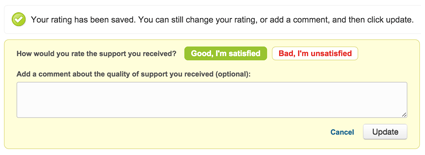
Zendesk also offers the option to add a customizable followup question for “Bad” survey results, and then use that reason in business rules to take action.
While you can change the wording for the email, you have no option to give more or fewer response options: Good and Bad are the only possibilities. This means that if you’re looking to experiment with more options (like offering a neutral response option or implementing Customer Effort Scores), you’re going to need to look outside of Zendesk.
Desk.com
Desk.com offers a few more options in their default template. You can choose how often the survey goes out, and whether you want 2 or 4 smiley faces. You can turn the additional question on or off.
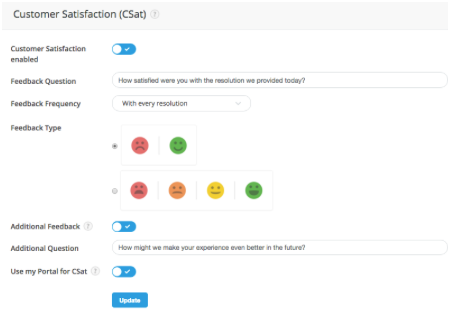
The rating system then attaches resolution of the ticket to the email.
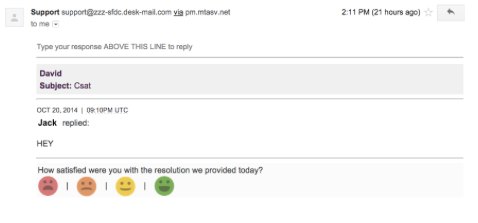
FreshDesk
FreshDesk has just recently rolled out new surveys this year. As a result, they provide the option to change the scale to 2, 3, 5, or 7 different response options. They’ve also added the possibility of adding follow-up questions. Unfortunately, customer satisfaction surveys are not available on the two cheapest plans.

Groove
The most bare bones of the default customer satisfaction surveys. Groove gives three response options. You cannot change any of the text. The survey goes out with a closed ticket email and there’s no way to change that either.
![]()
Kayako
Every Kayako account has the customer satisfaction survey enabled by default. It sends it 24 hours after agents close the ticket. This is a nice touch. Since it allows the dust to settle before asking customers how they felt (and doesn’t assume the resolution of the incident). Unfortunately, you cannot update any of the text. As well, there’re only two options for a response (Good/Bad), although it does request an additional comment.
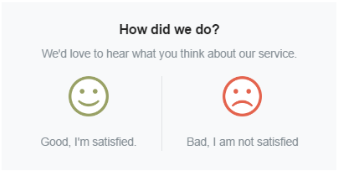
TeamSupport
Team Support uses a three-option rating system as well. Similarly, you can add the rating system onto the bottom of a resolved ticket email. Clicking on the question will open up a screen asking for comments. However, it doesn’t appear you can customise by a number of options or the questions asked.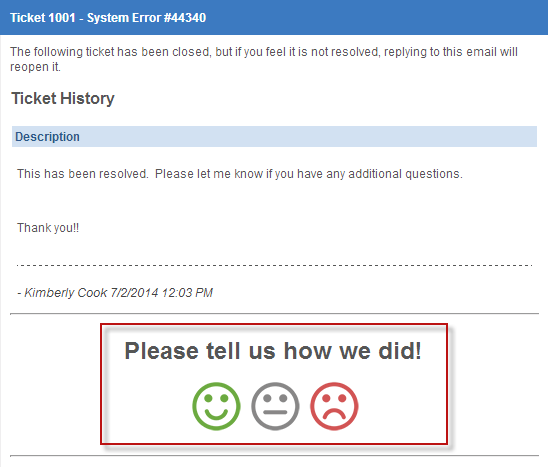
HappyFox
Setting up surveys in Happy Fox gives you quite a few options. You can send the survey out as a separate email on closed cases, and set up the survey, where you provide the full text. They offer either 2 or 3 rating options. Clicking on one of them encourages the customer to leave a comment. It’s definitely not as pretty as some of the other default options, but having full control is nice.
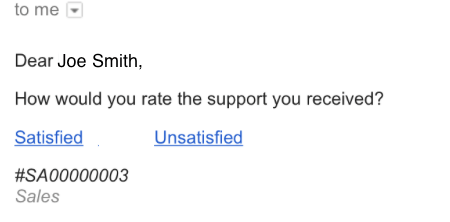
Help Scout
Help Scout customer satisfaction survey in one of the rare ones which add to every reply by default. They give three options, and you can edit the text of the links and question in a rich text editor.
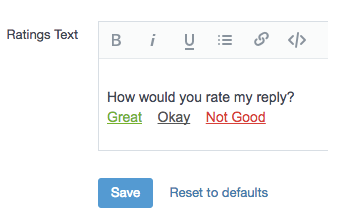
They as well provide “recipes” for including images.
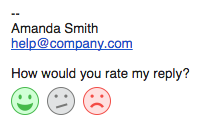
Moving on to a Dedicated Customer Satisfaction Survey Tool
If you’re not seeing what you need in a default help desk survey, you’ll want to reconsider. Try a purpose built survey tool for tracking customer satisfaction. There are three main reasons most teams move beyond the basic functionality of their Help Desk.
Survey customization
If you have big dreams, or clearly defined specifications for your customer surveys, you’ll want to look at a dedicated tool. A service like Nicereply will allow you to customize the number of response options, tailor images and add additional, conditional questions after asking about satisfaction. Advanced users can even access the Nicereply API to customize every survey to their needs completely.
Multichannel integrations
If you use multiple communication channels, you should use a satisfaction solution that allows you to collect information across all of them. For example, if your sales team uses something like Salesforce to contact prospects. Yet, your support team uses Zendesk. All you can do is to implement Nicereply across both tools to get a complete picture of customer satisfaction at every point in their lifecycle.
Deeper reporting options
Limited survey options mean limited insights. Using a more complete solution allows you to dig into the data at a more granular level. You can thus compare customer satisfaction across different teams, agents, and types of interactions to find out what really affects your customers’ happiness.
If any of these reasons resonate with your team’s goals this quarter, it’s time to move away from the basic. Explore the most advanced world of customer satisfaction survey tools. Give us a shout; we’d love to chat about your needs!







